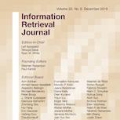Biases in culture, gender, ethnicity, etc. have existed for decades and have affected many areas of human social interaction. These biases have been shown to impact machine learning (ML) models, and for natural language processing (NLP), this can have severe consequences for downstream tasks. Mitigating gender bias in information retrieval (IR) is important to avoid propagating stereotypes. In this work, we employ a dataset consisting of two components: (1) relevance of a document to a query and (2) "gender" of a document, in which pronouns are replaced by male, female, and neutral conjugations. We definitively show that pre-trained models for IR do not perform well in zero-shot retrieval tasks when full fine-tuning of a large pre-trained BERT encoder is performed and that lightweight fine-tuning performed with adapter networks improves zero-shot retrieval performance almost by 20% over baseline. We also illustrate that pre-trained models have gender biases that result in retrieved articles tending to be more often male than female. We overcome this by introducing a debiasing technique that penalizes the model when it prefers males over females, resulting in an effective model that retrieves articles in a balanced fashion across genders.
翻译:文化、性别、种族等方面的偏见已经存在了几十年,并影响到人类社会互动的许多领域。这些偏见已经证明会影响机器学习模式(ML)和自然语言处理(NLP),这可能对下游任务产生严重后果。在信息检索(IR)中减少性别偏见对于避免传播陈规定型观念十分重要。在这项工作中,我们使用由两个组成部分组成的数据集:(1)文件与文件查询的相关性和(2)文件的“性别”,其中代名词往往由男性、女性和中性同族取而代之。我们明确表明,在对受过训练的大型BERT编码器进行全面微调时,IR的预培训模式在零速检索任务中表现不佳,而通过调整网络进行的轻量微调整则比基线提高了近20%的零光检索性业绩。我们还说明,经过培训的模型存在性别偏差,使得检索的物品往往由男性而不是女性取代。我们克服了这种偏差技术,即当它偏重男性而不是女性时,当它喜欢在女性之间找到一种平衡的模型时,它会有效地惩罚这种模式。




